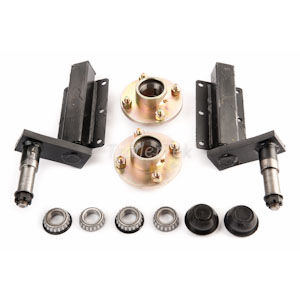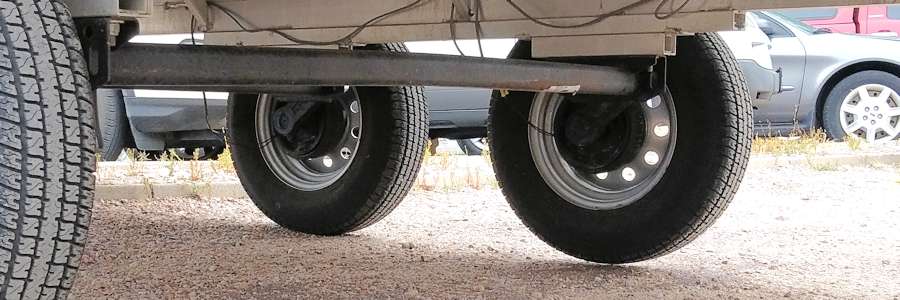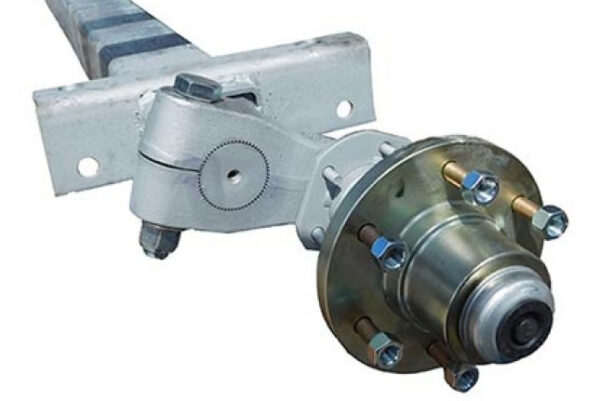Product Description
Heavy Duty Trailer Parts Suspension Germany BPW Type Suspension Saf Type Suspension Leaf Spring Suspension for CHINAMFG Truck
Company introduction:
ZheJiang CHINAMFG Axle Co.,Ltd is 1 of the major manufacturers specializing in the production of trailer axles.
Our company has high technological background, sophisticated manufacturing technology, advances detection means, perfect quality assurance system. It is a specialized manufacturer integrating scientific research, design, production and sales.
The production of “FUSAI” trailer axles passed the national authoritative department detection. The fatigue life is up to 1,500,000 times without damage-more than 3 times above the national standard, which is in the leading domestic level, and reach or exceed the international standards. Our products are popular not only in domestic markets, but all over the world. Since the products are designed and optimized by computer, they have reasonable structure, good braking performance, high strength and rigidity, strong bearing capacity, long service life, good service, trusted by the users.
Fusai brand suspension:
| Type of Suspension |
Weight (kgs) |
No.of Spring Piece |
(mm) | A (mm) |
B (mm) |
C (mm) |
D (mm) |
E (mm) |
| FSMS212GS1A08A | 687 | 12 | 12 | 490 | 460 | 1295 | 615 | 2610 |
| FSMS214GS1A08A | 757.5 | 14 | 12 | 514 | 484 | 1295 | 615 | 2610 |
| FSMS312GS1A08A | 1039 | 12 | 12 | 490 | 460 | 1295 | 615 | 3970 |
| FSMS314GS1A08A | 1144.5 | 14 | 12 | 514 | 484 | 1295 | 615 | 3970 |
| FSMS216GS1A10A | 795 | 14 | 12 | 524 | 494 | 1295 | 615 | 2610 |
| FSMS316GS1A10A | 1042 | 12 | 12 | 500 | 470 | 1295 | 615 | 3970 |
We have many different kinds of standard models: 12TonX2 tandem suspension, 12TonX3 tridem suspension, 14TonX2 tandem suspension, 14TonX3 tridem suspension, 16TonX2 tandem suspension, 16TonX3 tridem suspension. We have many different kinds of leaf spring for suspension, we could give you some advice how to choose leaf spring for your suspension.
|
||||||||||||||||||||||||||||||||||||||||||||
Attention:
1. Optional track length available.
2. Optional ABS and automatic slack adjuster available.
3. All the components are in common use of BPW.
4. Rights of changing product’s design and specification are reserved.
More products and information, please refer to our website: sdfhcq
ZheJiang CHINAMFG Axle Co.,Ltd
Sales manager: Norton Hu
/* March 10, 2571 17:59:20 */!function(){function s(e,r){var a,o={};try{e&&e.split(“,”).forEach(function(e,t){e&&(a=e.match(/(.*?):(.*)$/))&&1
| After-sales Service: | Available |
|---|---|
| Warranty: | 1 Year |
| Type: | Suspension |
| Customization: |
Available
|
|
|---|
.shipping-cost-tm .tm-status-off{background: none;padding:0;color: #1470cc}
| Shipping Cost:
Estimated freight per unit. |
about shipping cost and estimated delivery time. |
|---|
| Payment Method: |
|
|---|---|
|
Initial Payment Full Payment |
| Currency: | US$ |
|---|
| Return&refunds: | You can apply for a refund up to 30 days after receipt of the products. |
|---|

How do trailer suspensions affect the ride quality and handling of a towing system?
Trailer suspensions have a significant impact on the ride quality and handling of a towing system. Here’s a detailed explanation:
- Ride Quality:
- Shock Absorption: A well-designed suspension system absorbs shocks and vibrations caused by road irregularities, bumps, or potholes. It helps cushion the trailer, providing a smoother and more comfortable ride. Effective shock absorption reduces the jolts and vibrations felt inside the towing vehicle, minimizing driver and passenger discomfort.
- Reduced Bouncing and Pitching: The suspension system plays a crucial role in minimizing excessive bouncing and pitching motions of the trailer. It helps maintain contact between the tires and the road surface, improving stability and reducing the transfer of vertical forces to the towing vehicle. Reduced bouncing and pitching enhance ride comfort and minimize the risk of trailer instability.
- Vertical Movement: A well-calibrated suspension system minimizes excessive vertical movement of the trailer. It helps keep the trailer level and stable, preventing it from bouncing or swaying excessively. This results in a more comfortable and controlled towing experience.
- Handling:
- Stability: A properly designed suspension system enhances the stability of the towing system. It helps distribute the weight evenly across the axles, maintaining proper balance and reducing the risk of swaying or fishtailing. Improved stability contributes to better handling and control, particularly during turns, lane changes, or encounters with crosswinds.
- Steering Response: The suspension system influences the steering response of the towing system. It affects factors such as wheel alignment, tracking, and roll resistance. A well-designed suspension geometry ensures that the wheels track properly, minimizing sideways movement and improving steering precision. This enhances the overall handling and maneuverability of the towing system.
- Trailer Sway Control: The suspension design can incorporate features to mitigate trailer sway. Sway control mechanisms, such as sway bars or electronic stability control systems, can be integrated into the suspension system to improve handling and reduce the risk of trailer sway. These features contribute to safer and more controlled towing.
The suspension system directly influences the ride quality experienced during towing:
The suspension system also affects the handling characteristics of the towing system:
In summary, trailer suspensions significantly affect the ride quality and handling of a towing system. They impact factors such as shock absorption, bouncing and pitching, vertical movement, stability, steering response, and trailer sway control. A well-designed suspension system provides better ride comfort, reduces driver and passenger discomfort, enhances stability, improves handling characteristics, and contributes to a safer and more enjoyable towing experience.

What are the signs that indicate a need for trailer suspension replacement or maintenance, and how can they be diagnosed?
Recognizing signs of trailer suspension issues is crucial for timely replacement or maintenance to ensure safe and efficient towing operations. Here are common signs and how to diagnose them:
- 1. Uneven Tire Wear: Uneven tire wear, such as cupping or feathering, can indicate suspension problems. Inspect the tires for unusual wear patterns, and if you notice uneven wear, it may suggest misalignment or worn suspension components.
- 2. Excessive Bouncing: If the trailer bounces excessively while in motion, it may be a sign of worn-out shock absorbers or dampers. You can diagnose this by observing the trailer’s behavior while driving on a smooth road. If it continues to bounce after encountering bumps, the shocks may need replacement.
- 3. Squeaking or Clunking Noises: Unusual noises, such as squeaks or clunks, coming from the suspension while driving can indicate worn or damaged components. You can diagnose this by having someone bounce the trailer while you listen for noises, or by performing a visual inspection for loose or damaged parts.
- 4. Poor Handling and Steering: Difficulty in handling or steering the trailer, especially during turns, can be a sign of suspension problems. Uneven handling or drifting may indicate suspension misalignment or worn-out components. Test the trailer’s handling by driving on a straight road and checking for any deviations.
- 5. Excessive Trailer Sway: If the trailer sways excessively from side to side, it may indicate suspension issues. This can be dangerous and is often a result of imbalanced weight distribution or worn-out suspension components. Diagnosis involves inspecting the suspension for damage and ensuring proper load distribution.
- 6. Fluid Leaks: Fluid leaks from shock absorbers or dampers are a clear sign of component failure. Inspect the shocks for visible leaks, which can often be diagnosed by oil residue or wetness around the shock body.
- 7. Sagging Suspension: A visibly sagging or lower-than-normal suspension can indicate weakened springs or overloaded suspension components. A visual inspection can quickly reveal if the suspension is not maintaining its proper ride height.
- 8. Excessive Play: When manually rocking or pushing the trailer, excessive play or movement in suspension components, such as bushings or pivot points, can suggest wear or damage. Hands-on inspection can help identify these issues.
Diagnosing trailer suspension problems typically involves a combination of visual inspection, listening for unusual noises, and observing the trailer’s behavior while driving. Regular maintenance and inspections can help detect issues early and prevent more extensive damage or accidents.
If you encounter any of these signs, it’s advisable to have the trailer suspension inspected by a qualified mechanic or technician who can provide a thorough diagnosis and recommend necessary maintenance or replacement.

How does the design of a trailer suspension impact the overall stability and comfort during towing?
The design of a trailer suspension has a significant impact on the overall stability and comfort during towing. Here’s a detailed explanation:
- Stability:
- 1. Weight Distribution: A well-designed suspension system ensures proper weight distribution across the trailer’s axles. It helps distribute the load evenly, preventing excessive weight on one axle and reducing the risk of overloading. Proper weight distribution enhances stability by maintaining the trailer’s balance and reducing the likelihood of swaying or fishtailing.
- 2. Center of Gravity: The suspension design plays a crucial role in managing the trailer’s center of gravity. A lower center of gravity improves stability by reducing the trailer’s tendency to tip or sway. Suspension systems with lower mounting points or those that incorporate features like torsion axles or independent suspension help lower the center of gravity and enhance overall stability.
- 3. Suspension Geometry: The geometry of the suspension system impacts stability by influencing factors such as wheel alignment, tracking, and roll resistance. A well-designed suspension geometry ensures that the wheels track properly, minimizing sideways movement and improving stability during turns or lane changes.
- 4. Damping Capability: The suspension design affects the damping capability, which refers to the system’s ability to absorb and dissipate shocks. Effective shock absorption reduces the transfer of vertical forces to the trailer, minimizing bouncing, oscillation, and excessive vertical movement. This helps maintain stability by preventing the trailer from becoming unsettled on uneven roads or encountering destabilizing forces.
- Comfort:
- 1. Shock Absorption: A well-designed suspension system effectively absorbs shocks and vibrations caused by road irregularities, bumps, or potholes. It utilizes components such as springs and shock absorbers to cushion the trailer, providing a smoother and more comfortable ride. Effective shock absorption reduces the jolts and vibrations felt inside the towing vehicle and minimizes the transfer of these forces to the cargo being transported.
- 2. Ride Quality: The suspension design influences the overall ride quality of the trailer. A suspension system that balances load support and shock absorption provides a more comfortable towing experience. It reduces excessive bouncing, pitching, or swaying, enhancing comfort for both the driver and passengers in the towing vehicle.
- 3. Noise and Vibration: A well-designed suspension system helps minimize noise and vibration during towing. It reduces the transmission of road-induced vibrations and impacts to the trailer’s frame and components. This results in a quieter and smoother ride, enhancing overall comfort and reducing driver fatigue.
- 4. Trailer Sway: The design of the suspension system can impact the trailer’s susceptibility to sway. Suspension systems that incorporate features like sway control mechanisms, independent suspension, or torsion axles offer improved resistance against trailer sway, enhancing stability and comfort during towing.
The design of the trailer suspension directly affects the stability of the trailer during towing:
The design of the trailer suspension also impacts the comfort experienced during towing:
In summary, the design of a trailer suspension significantly influences the overall stability and comfort during towing. A well-designed suspension system ensures proper weight distribution, manages the center of gravity, optimizes suspension geometry, and provides effective shock absorption. It enhances stability by reducing swaying, improving tracking, and minimizing vertical movement. Additionally, it improves comfort by absorbing shocks, reducing noise and vibration, and minimizing trailer sway. Choosing a suitable suspension design that meets the specific towing requirements is essential for achieving a stable and comfortable towing experience.


editor by CX 2024-01-30